Big Red Book
Celebrating television's This Is Your Life
11 October 1980
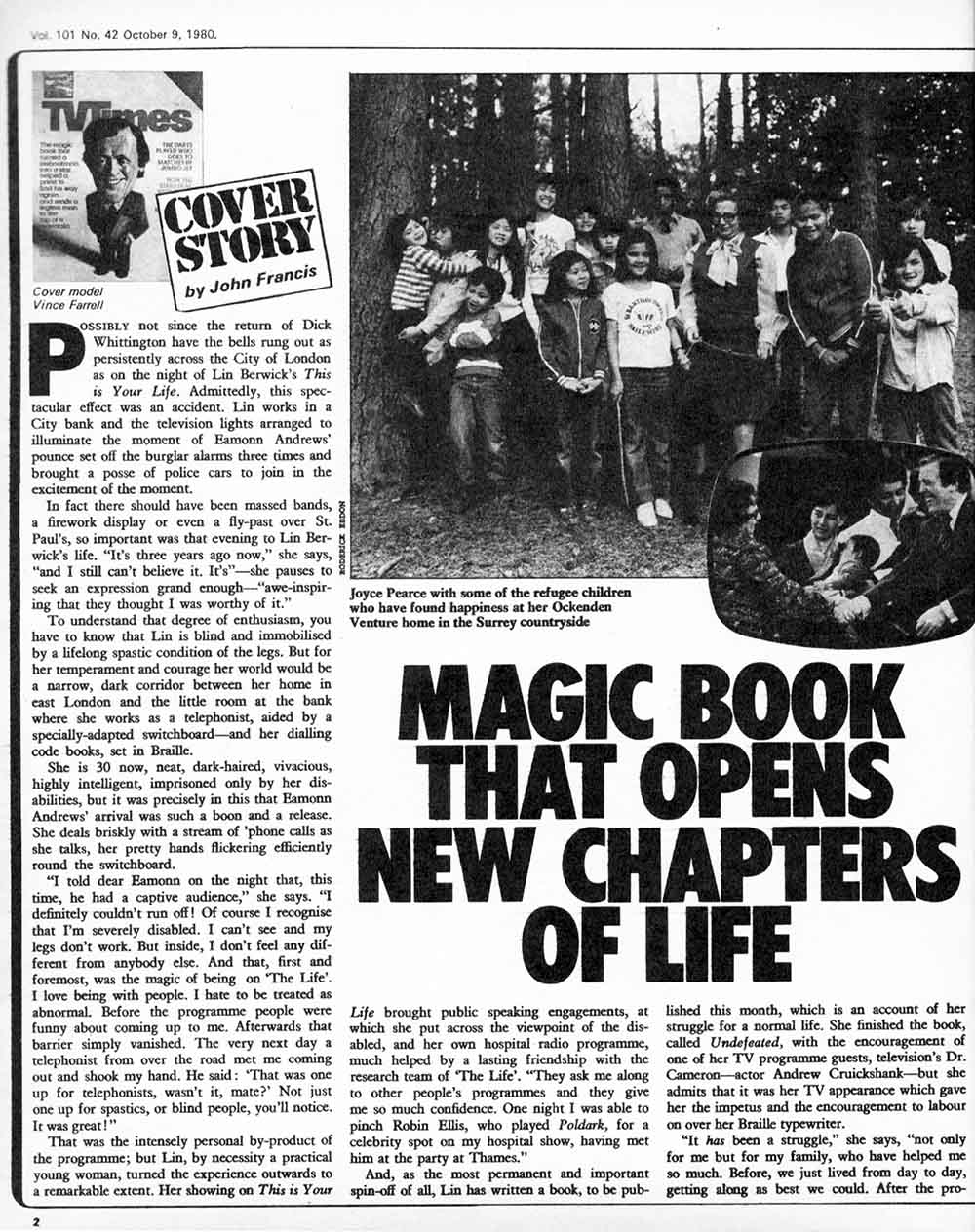
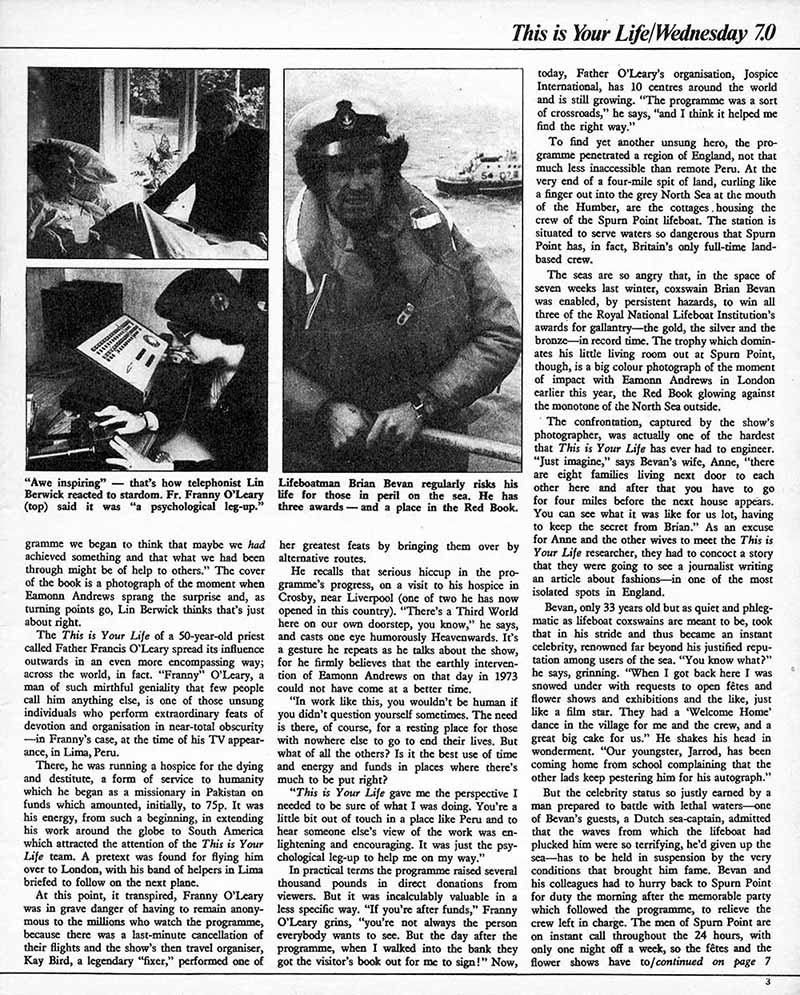
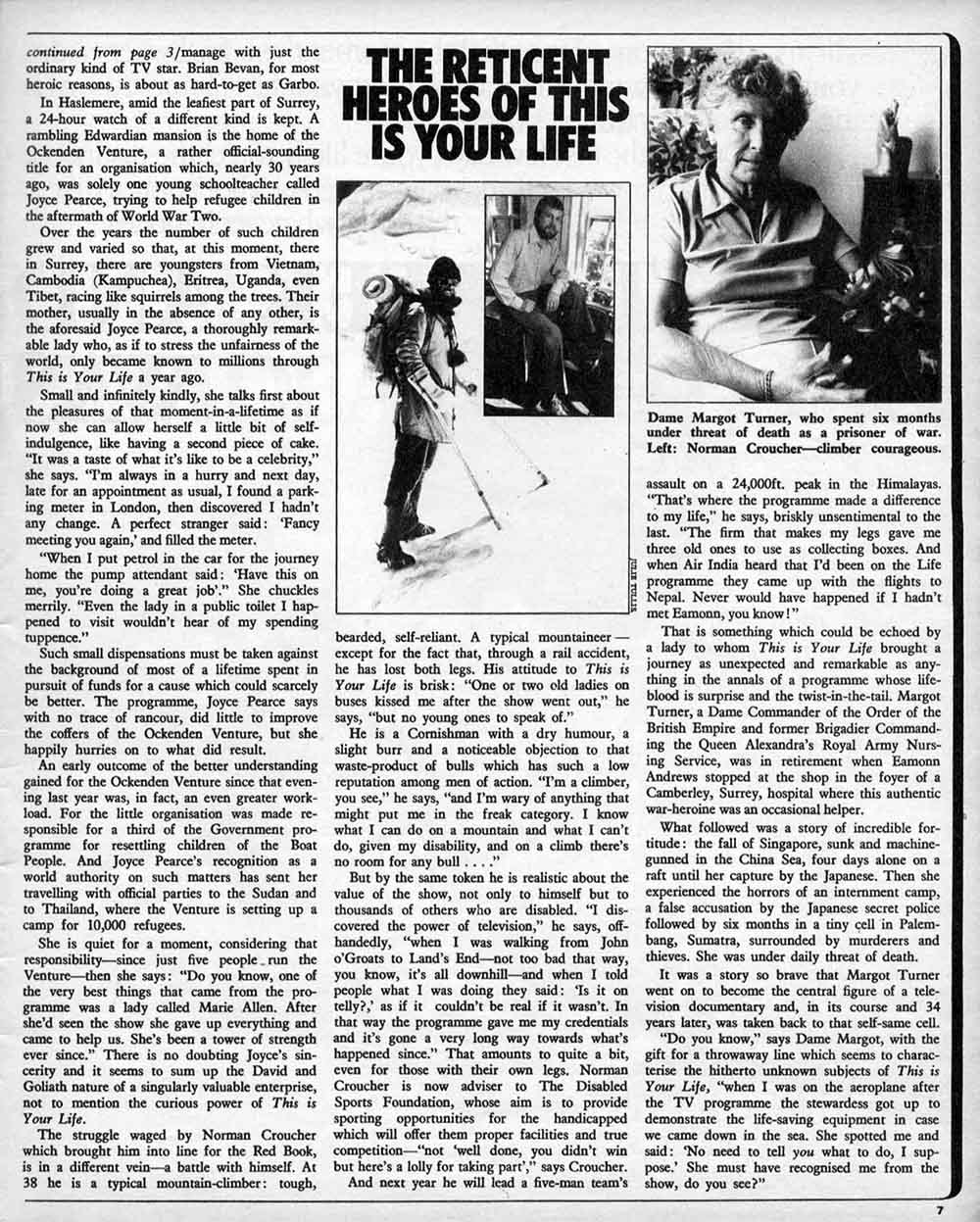
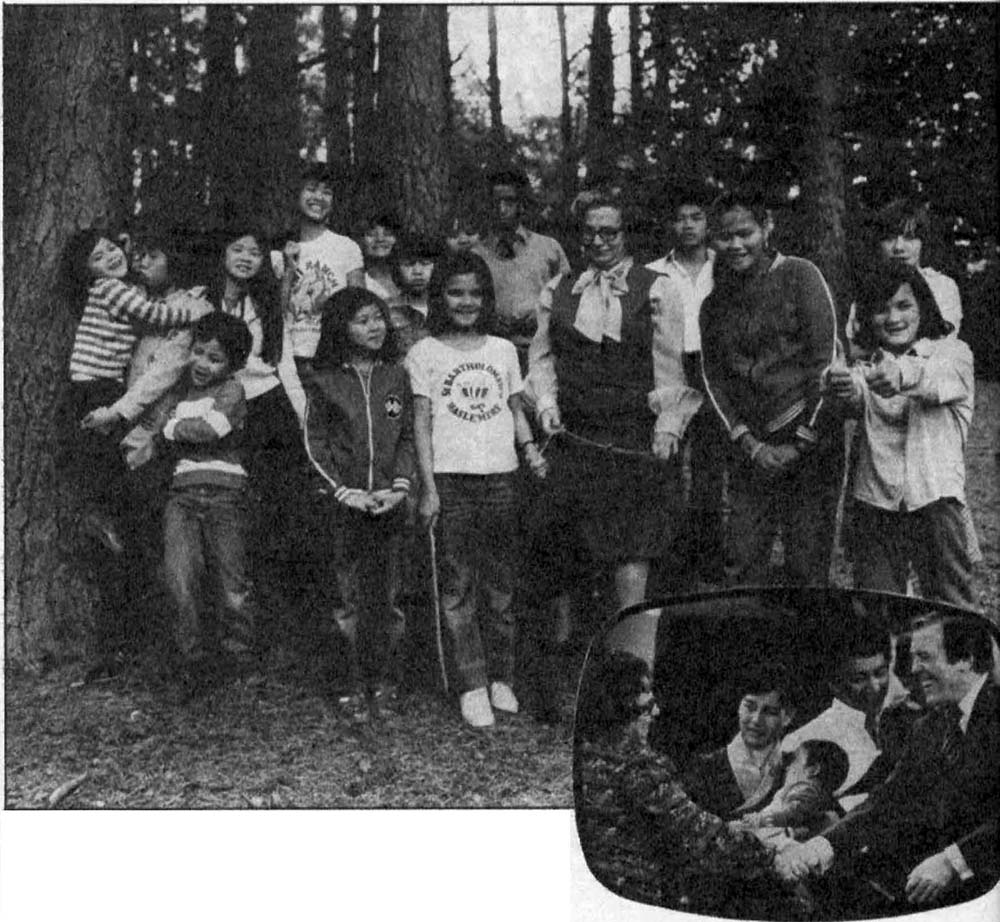
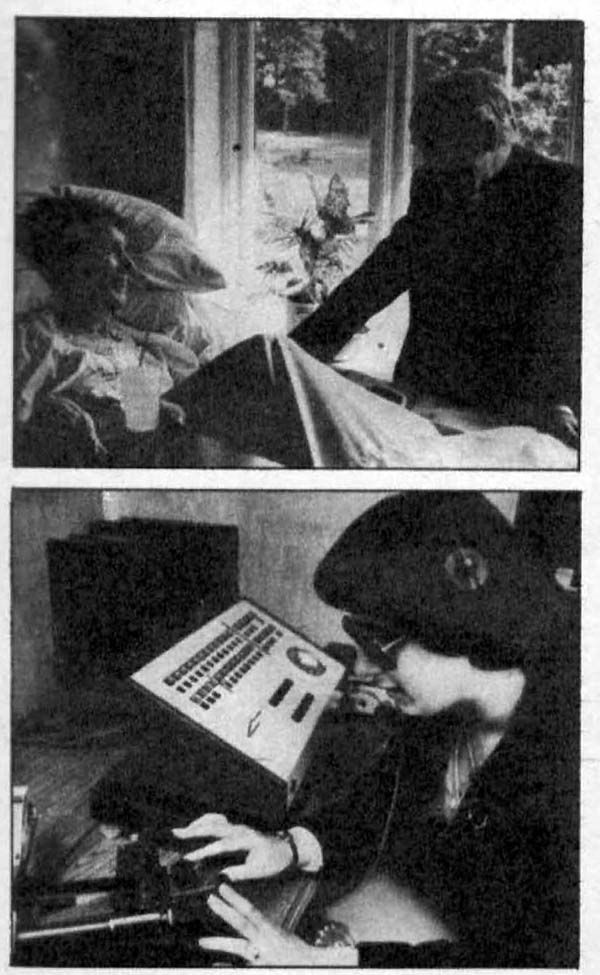
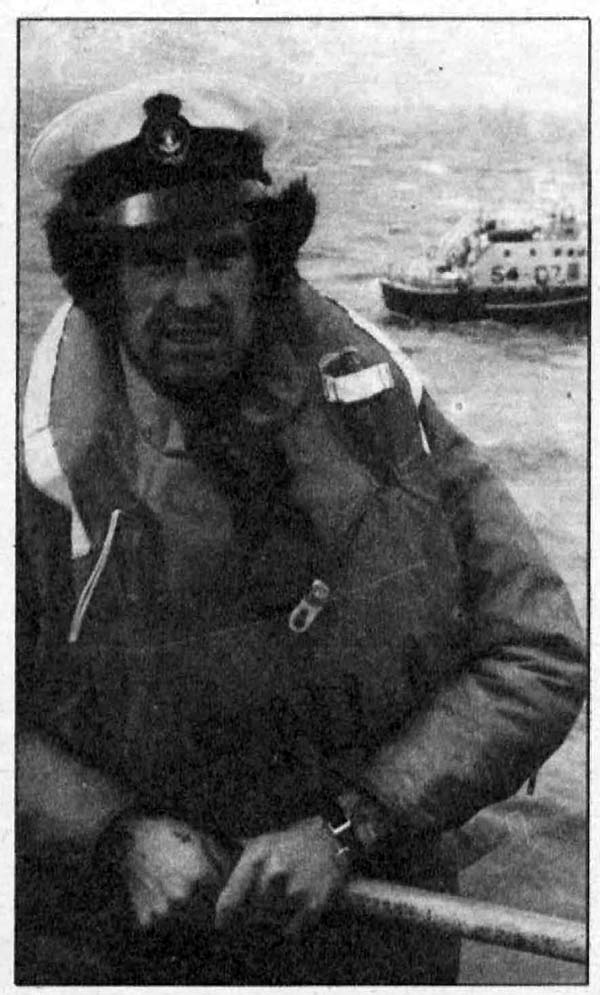
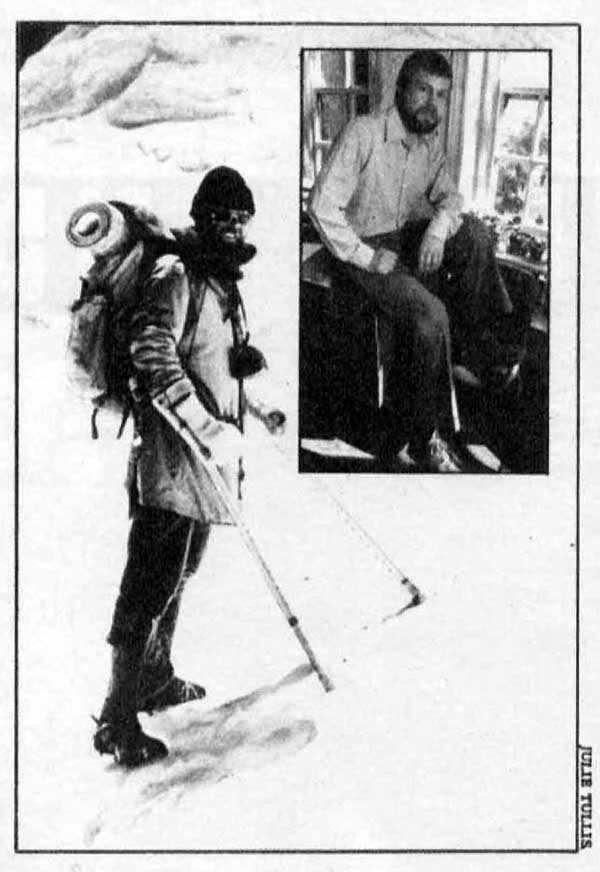
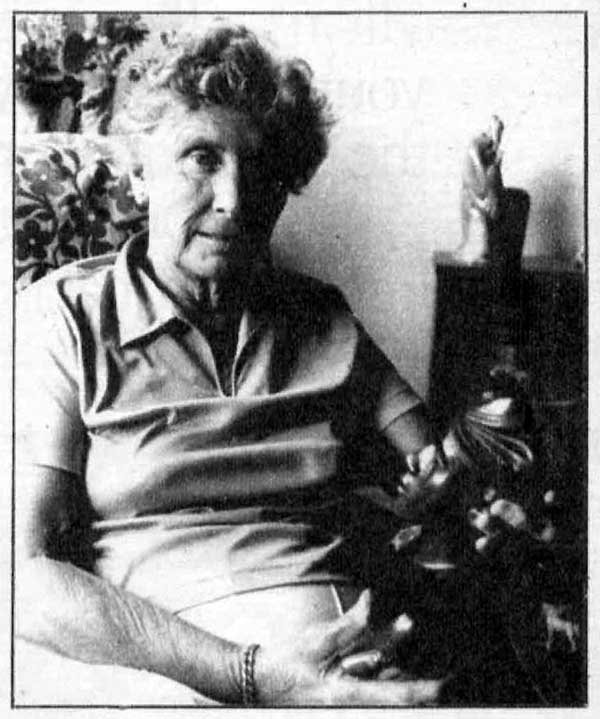
the unsung heroes
celebrating the 'men of God'
heroes of the emergency services
by John Francis
Possibly not since the return of Dick Whittington have the bells rung out as persistently across the City of London as on the night of Lin Berwick's This is Your Life. Admittedly, this spectacular effect was an accident. Lin works in a City bank and the television lights arranged to illuminate the moment of Eamonn Andrews' pounce set off the burglar alarms three times and brought a posse of police cars to join in the excitement of the moment.
In fact there should have been massed bands, a firework display or even a fly-past over St Paul's, so important was that evening to Lin Berwick's life. "It's three years ago now," she says, "and I still can't believe it. It's" – she pauses to seek an expression grand enough – "awe-inspiring that they thought I was worthy of it."
To understand that degree of enthusiasm, you have to know that Lin is blind and immobilised by a lifelong spastic condition of the legs. But for her temperament and courage her world would be a narrow, dark corridor between her home in east London and the little room at the bank where she works as a telephonist, aided by a specially-adapted switchboard – and her dialling code books, set in Braille.
She is 30 now, neat, dark-haired, vivacious, highly intelligent, imprisoned only by her disabilities, but it was precisely in this that Eamonn Andrews' arrival was such a boon and a release. She deals briskly with a stream of phone calls as she talks, her pretty hands flickering efficiently round the switchboard.
"I told dear Eamonn on the night that, this time, he had a captive audience," she says, "I definitely couldn't run off! Of course I recognise that I'm severely disabled. I can't see and my legs don't work. But inside, I don't feel any different from anybody else. And that, first and foremost, was the magic of being on 'The Life'. I love being with people. I hate to be treated as abnormal. Before the programme people were funny about coming up to me."
"Afterwards that barrier simply vanished. The very next day a telephonist from over the road met me coming out and shook my hand. He said: 'That was one up for telephonists, wasn't it, mate?' Not just one up for spastics, or blind people, you'll notice. It was great!"
That was the intensely personal by-product of the programme; but Lin, by necessity a practical young woman, turned the experience outwards to a remarkable extent. Her showing on This Is Your Life brought public speaking engagements, at which she put across the viewpoint of the disabled, and her own hospital radio programme, much helped by a lasting friendship with the research team of 'The Life'. "They ask me along to other people's programmes and they give me so much confidence. One night I was able to pinch Robin Ellis, who played Poldark, for a celebrity spot on my hospital show, having met him at a party at Thames."
And, as the most permanent and important spin-off of all, Lin has written a book, to be published this month, which is an account of her struggle for a normal life. She finished the book, called Undefeated, with the encouragement of one of her TV programme guests, television's Dr Cameron – actor Andrew Cruickshank – but she admits that it was her TV appearance which gave her the impetus and the encouragement to labour on over her Braille typewriter.
"It has been a struggle," she says, "not only for me but for my family, who have helped me so much. Before, we just lived from day to day, getting along as best we could. After the programme we began to think that maybe we had achieved something and that what we had been through might be of help to others." The cover of the book is a photograph of the moment when Eamonn Andrews sprang the surprise and, as turning points go, Lin Berwick thinks that's just about right.
The This Is Your Life of a 50-year-old priest called Father Francis O'Leary spread its influence outwards in an even more encompassing way; across the world, in fact. "Franny" O'Leary, a man of such mirthful geniality that few people call him anything else, is one of those unsung individuals who perform extraordinary feats of devotion and organisation in near-total obscurity – in Franny's case, at the time of his TV appearance, in Lima, Peru.
There, he was running a hospice for the dying and destitute, a form of service to humanity which he began as a missionary in Pakistan on funds which amounted, initially, to 75p. It was his energy, from such a beginning, in extending his work around the globe to South Africa which attracted the attention of the This Is Your Life team. A pretext was found for flying him over to London, with his band of helpers in Lima briefed to follow on the next plane.
At this point, Franny O'Leary was in grave danger of having to remain anonymous to the millions who watch the programme, because there was a last-minute cancellation of their flights and the show's then travel organiser, Kay Bird, a legendary "fixer", performed one of her greatest feats by bringing them over by alternative routes.
He recalls that serious hiccup in the programme's progress, on a visit to his hospice in Crosby, near Liverpool (one of the two he has now opened in this country). "There's a Third World here on our own doorstep, you know," he says, and casts one eye humorously Heavenwards. It's a gesture he repeats as he talks about the show, for he firmly believes that the earthly intervention of Eamonn Andrews on that day in 1973 could not have come at a better time.
"In work like this, you wouldn't be human if you didn't question yourself sometimes. The need is there, of course, for a resting place for those with nowhere else to go to end their lives. But what of all the others? Is it the best use of time and energy and funds in places where there's much to be put right?"
"This is Your Life gave me the perspective I need to be sure of what I was doing. You're a little bit out of touch in a place like Peru and to hear someone else view of the work was enlightening and encouraging. It was just the psychological leg-up to help me on my way."
In practical terms the programme raised several thousand pounds in direct donations from viewers. But it was incalculably valuable in a less specific way. "If you're after funds," Franny O'Leary grins, "you're not always the person everybody wants to see. But the day after the programme, when I walked into the bank they got the visitor's book out for me to sign!" Now, today, Father O'Leary's organisation, Jospice International, has 10 centres around the world and is still growing. "The programme was a sort of crossroads," he says, "and I think it helped me find the right way."
To find yet another unsung hero, the programme penetrated a region of England, not that much less inaccessible than remote Peru. At the very end of a four-mile spit of land, curling like a finger out into the grey North Sea at the mouth of the Humber, are the cottages housing the crew of the Spurn Point lifeboat. The station is situated to serve waters so dangerous that Spurn Point has, in fact, Britain's only full-time land-based crew.
The seas are so angry that, in the space of seven weeks last winter, coxswain Brian Bevan was enabled, by persistent hazards, to win all three of the Royal National Lifeboat Institution's awards for gallantry – the gold, the silver and the bronze – in record time. The trophy which dominates his little living room out at Spurn Point, though, is a big colour photograph of the moment of impact with Eamonn Andrews in London earlier this year, the Red Book glowing against the monotone of the North Sea outside.
The confrontation, captured by the show's photographer, was actually one of the hardest that This Is Your Life has ever had to engineer. "Just imagine," says Bevan's wife, Anne, "there are eight families living next door to each other here and after that you have to go for four miles before the next house appears. You can see what it was like for us lot, having to keep the secret from Brian." As an excuse for Anne and the other wives to meet the This Is Your Life researcher, they had to concoct a story that they were going to see a journalist writing an article about fashions – in one of the most isolated spots in England.
Bevan, only 33 years old but as quiet and phlegmatic as lifeboat coxswains are meant to be, took that in his stride and thus became an instant celebrity, renowned far beyond his justified reputation among users of the sea. "You know what?" he says, grinning. "When I got back here I was snowed under with requests to open fetes and flower shows and exhibitions and the like, just like a film star. They had a 'Welcome Home' dance in the village for me and the crew, and a great big cake for us." He shakes his head in wonderment. "Our youngster, Jarrod, has been coming home from school complaining that the other lads keep pestering him for an autograph."
But the celebrity status so justly earned by a man prepared to battle with lethal waters – one of Bevan's guests, a Dutch sea-captain, admitted that the waves from which the lifeboat had plucked him were so terrifying, he'd given up the sea – has to be held in suspension by the very conditions that brought him fame. Bevan and his colleagues had to hurry back to Spurn Point for duty the morning after the remarkable party which followed the programme, to relieve the crew left in charge. The men of Spurn Point are on instant call throughout the 24 hours, with only one night off a week, so the fetes and the flower shows have to manage with just the ordinary kind of TV star. Brian Bevan, for the most heroic reason, is about as hard-to-get as Garbo.
In Haselmere, amid the leafiest part of Surrey, a 24-hour watch of a different kind is kept. A rambling Edwardian mansion is the home of the Ockenden Venture, a rather official-sounding title for an organisation which, nearly 30 years ago, was solely one young schoolteacher called Joyce Pearce, trying to help refugee children in the aftermath of World War Two.
Over the years the number of such children grew and varied so that, at this moment, there in Surrey, there are youngsters from Vietnam, Cambodia (Kampuchea), Eritrea, Uganda, even Tibet, racing like squirrels among the trees. Their mother, usually in the absence of any other, is the aforesaid Joyce Pearce, a thoroughly remarkable lady who, as if to stress the unfairness of the world, only became known to millions through This Is Your Life a year ago.
Small and infinitely kindly, she talks first about the pleasures of that moment-in-a-lifetime as if now she can allow herself a little bit of self-indulgence, like having a second piece of cake. "It was a taste of what it's like to be a celebrity," she says. "I'm always in a hurry and next day, late for an appointment as usual, I found a parking meter in London, then discovered I hadn't any change. A perfect stranger said: "Fancy meeting you again," and filled the meter."
"When I put petrol in the car for the journey home the pump attendant said: 'Have this on me, you're doing a great job'." She chuckles merrily. "Even the lady in the public toilet I happened to visit wouldn't hear of my spending tuppence."
Such small dispensations must be taken against the background of most of a lifetime spent in pursuit of funds for a cause which could scarcely be better. The programme, Joyce Pearce says with no trace of rancour, did little to improve the coffers of the Ockenden Venture, but she happily hurries on to what did result.
An early outcome of the better understanding gained for the Ockenden Venture since that evening last year was, in fact, an even greater workload. For the little organisation was made responsible for a third of the Government programme for resettling children of the Boat People. And Joyce Pearce's recognition as a world authority on such matters has sent her travelling with official parties to the Sudan and to Thailand, where the Venture is setting up a camp for 10,000 refugees.
She is quiet for a moment, considering that responsibility – since just five people run the Venture – then she says: "Do you know, one of the very best things that came from the programme was a lady called Marie Allen. After she'd seen the show she gave up everything and came to help us. She's been a tower of strength ever since." There is no doubting Joyce's sincerity and it seems to sum up that David and Goliath nature of a singularly valuable enterprise, not to mention the curious power of This Is Your Life.
The struggle waged by Norman Croucher which brought him into line for the Red Book, is in a different vein – a battle with himself. At 38 he is a typical mountain-climber: tough, bearded, self-reliant. A typical mountaineer – except for the fact that, through a rail accident, he has lost both legs. His attitude to This Is Your Life is brisk: "One or two old ladies on buses kissed me after the show went out," he says, "but no young ones to speak of."
He is a Cornishman with a dry humour, a slight burr and a noticeable objection to that waste-product of bulls which has such a low reputation among men of action. "I'm a climber, you see," he says, "and I'm wary of anything that might put me in the freak category. I know what I can do on a mountain and what I can't do, given my disability, and on a climb there's no room for any bull..."
But by the same token he is realistic about the value of the show, not only to himself but to thousands of others who are disabled. "I discovered the power of television," he says, off-handedly, "when I was walking from John o'Groats to Land's End – not too bad that way, you know, it's all downhill – and when I told people what I was doing they said: 'Is it on telly?,' as if it couldn't be real if it wasn't. In that way the programme gave me my credentials and it's gone a very long way towards what's happened since." That amounts to quite a bit, even for those with their own legs.
Norman Croucher is now advisor to The Disabled Sports Foundation, whose aim is to provide sporting opportunities for the handicapped which will offer them proper facilities and true competition – "not well done, you didn't win but here's a lolly for taking part," says Croucher.
And next year he will lead a five-man team's assault on a 24,000ft. peak in the Himalayas. "That's where the programme made a difference to my life," he says, briskly unsentimental to the last. "The firm that makes my legs gave me three old ones to use as collecting boxes. And when Air India heard that I'd been on the Life programme they came up with the flights to Nepal. Never would have happened if I hadn't met Eamonn, you know!"
That is something which could be echoed by a lady to whom This Is Your Life brought a journey as unexpected and remarkable as anything in the annals of a programme whose life-blood is surprise and the twist-in-the-tail. Margot Turner, a Dame Commander of the Order of the British Empire and former Brigadier Commanding the Queen's Alexandra's Royal Army Nursing Service, was in retirement when Eamonn Andrews stopped at the shop in the foyer of a Camberley, Surrey, hospital where this authentic war-heroine was an occasional helper.
What followed was a story of incredible fortitude: the fall of Singapore, sunk and machine-gunned in the China Sea, four days alone on a raft until her capture by the Japanese. Then she experienced the horrors of an internment camp, a false accusation by the Japanese secret police followed by six months in a tiny cell in Palembang, Sumatra, surrounded by murderers and thieves. She was under daily threat of death.
It was a story so brave that Margot Turner went on to become the central figure of a television documentary and, in its course and 34 years later, was taken back to that self-same cell.
"Do you know," says Dame Margot, with the gift for a throwaway line which seems to characterise the hitherto unknown subjects of This Is Your Life, "when I was on the aeroplane after the TV programme the stewardess got up to demonstrate the life-saving equipment in case we came down in the sea. She spotted me and said: 'No need to tell you what to do, I suppose.' She must have recognised me from the show, do you see?"